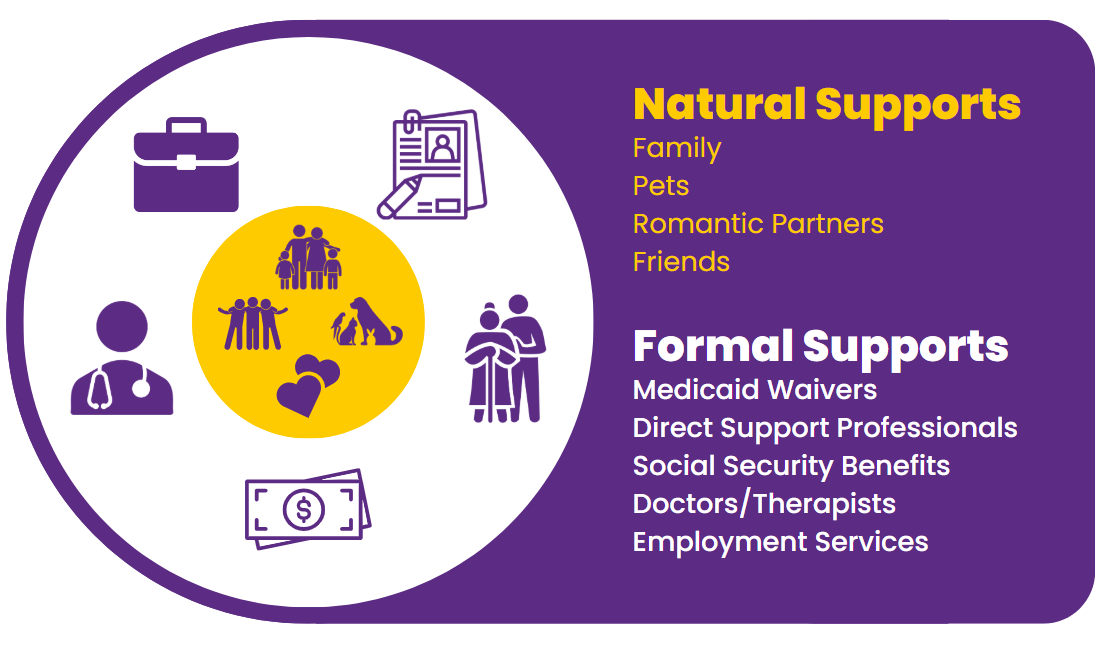Adulthood
Some of us define “adulthood” differently, but the law states that when a person turns 18, they get to take charge of their own life. This means that we get to make choices about who we spend our time with, where we want to live, and a job that is meaningful to us. To be successful as an adult, we need to know what our rights and responsibilities are, what kind of supports we can use, how to make healthcare decisions, and more!
Rights and Responsibilities
Once you turn 18 years old you are officially a legal adult. It is a big deal for everyone! You are the person that makes your own legal, financial, medical and educational decisions. You have new rights and responsibilities
Your Rights
- The right to vote in local, state, and federal elections.
- The right to make decisions about your IEP and other educational decisions.
- The right to live independently from your parents and be free of their control
- The right to get married without permission from your parents.
- You have the right to enter into a contract - for a car, apartment etc.
- You have the right to make a will.
- You have the right to make decisions about your medical care.
- You have the right to make financial decisions.
Your Responsibilities
- If you were born male, then you must register with the Selective Service
- You are responsible for all of your actions. If you violate the law, you will be tried as an adult.
- You may sue and be sued by others.
- You may be called for jury duty.

Building a Support Network
Every adult needs support sometimes! For people with disabilities, we can be very focused on "Formal Supports." These supports can include services like Medicaid, direct support professionals/attendants, Social Security benefits, doctors/therapists, and employment services. It is important to figure out what you need and which of these supports may help you.
It is also so important for you, as an adult with a disability, to know you are worthy of "Natural Supports" like everyone else. These are usually your inner circle - loved ones you trust and can turn to for ideas, feedback, and help. Have planning conversations with your loved ones to figure out what your needs are, what their needs are, and how you can be there for each other.
Your Healthcare
Anyone without a guardian or Medical Power of Attorney takes the lead on their healthcare decisions when they turn 18. This means choosing doctors you like, taking wellness classes that interest you, choosing/managing your health insurance, and more. A few important things you will want to plan for are:
- Talking to your doctor (pediatrician) about what the cut-off age is for their office. Some pediatricians go to age 18, some go to 26.
- Most health insurance companies allow adult children to stay on their parents' insurance until they turn 26. Start exploring options like employee health insurance, Medicaid, or the Virginia Health Insurance Marketplace before you turn 26.
- Whenever you look at getting a new doctor, check to make sure they accept your insurance!
- You will most likely be managing your prescriptions and over-the-counter medications. Setting timers, calendar reminders, and using pill boxes can help with accommodations for managing medications.
- All patients are protected by something called a Patient Bill of Rights.
- You do not have to stay with a doctor who makes you feel uncomfortable.
- You can always get a second opinion.
- Unless you have a guardian or Medical Power of Attorney, your doctors should never share your information without your permission.
Additional Resource Topics for Adults

